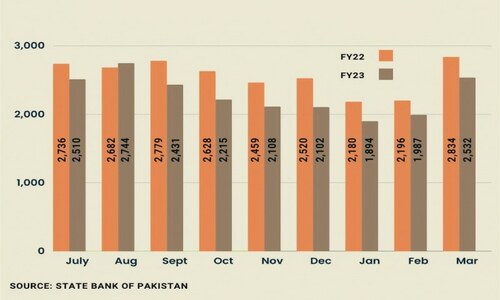The International Monetary Fund (IMF) slightly lowered its outlook for the global economy on Tuesday, while predicting that most countries will avoid a recession this year despite economic and geopolitical concerns.
The IMF predicted the global economy will grow by 2.8 per cent this year and 3pc in 2024, a decline of 0.1pc point from its previous forecasts in January.
The American economy is expected to grow by 1.6pc in 2023, up 0.2pc points from the IMF’s previous forecast. US growth is then predicted to slow to 1.1pc next year, up 0.1pc point from January.
“The global economy is recovering from the shocks of the last few years, and particularly of course the pandemic, but also the Russian invasion of Ukraine,” IMF chief economist Pierre-Olivier Gourinchas said in a press briefing ahead of the release of the IMF’s World Economic Outlook (WEO) report.
The leadership of the World Bank and IMF hope to use this year’s spring meetings to promote an ambitious reform and fundraising agenda.
But their efforts will likely be overshadowed by concerns among member states over high inflation, rising geopolitical tension, and financial stability.
The overall picture painted by the WEO is a gloomy one, with global growth forecast to slow in both the short and medium terms.
Close to 90 pc of advanced economies will experience slowing growth this year, while Asia’s emerging markets are expected to see a substantial rise in the economic output — with India and China predicted to account for half of all growth, IMF managing director Kristalina Georgieva said last week.
Low-income countries, meanwhile, are expected to suffer a double shock from higher borrowing costs due to high-interest rates, and a decline in demand for their exports, Georgieva said. This could worsen poverty and hunger.
The IMF expects global inflation to slow to 7pc this year, down from 8.7pc last year, according to the WEO forecasts.
This figure remains significantly above the 2pc target set by the US Federal Reserve and other central banks around the world, suggesting monetary policymakers have a long way to go before inflation is brought back under control.
The IMF’s baseline forecasts assume that the financial instability sparked by the collapse of Silicon Valley Bank last month has been broadly contained by the “forceful actions” of regulators on both sides of the Atlantic, Gourinchas told reporters.
But he added that central banks and policymakers have an important role to play to buttress financial stability going forward.
While the picture is one of slowing growth, almost all advanced economies are still expected to avoid a recession this year and next.
Alongside the growth in the US, the Euro area is also forecast to grow by 0.8pc this year, and 1.4pc next year, led by Spain, which will see 1.5pc growth in 2023 and 2pc growth in 2024.
But Germany is now expected to contract by 0.1pc this year, joining the UK as the only G7 economy expected to enter recession this year.
The picture is more positive among emerging market economies, with China forecast to grow by 5.2pc this year. But its economic growth is predicted to slow to 4.5pc in 2024, as the impact of its reopening from the Covid-19 pandemic fades.
India’s economic forecast has been downgraded from the previous forecast in January, but it is still predicted to grow by 5.9pc this year and 6.3pc in 2024, providing some much-needed stimulus to the global economy.
And Russia is now expected to grow by 0.7pc this year, up 0.3pc point on January’s forecast, despite its invasion of Ukraine.
Looking forward, the IMF forecasts that global growth will fall to three pc in 2028, its lowest medium-term forecast since 1990.
Slowing population growth and the end of the era of economic catch-up by several countries including China and South Korea are a large part of the expected slowdown, as are concerned about low productivity in many countries, according to Daniel Leigh, who heads the World Economic Studies division in the IMF’s Research Department.
“A lot of the low-hanging fruit was picked,” he told reporters ahead of the publication of the WEO report.
“On top of that now, with the geopolitical tensions and fragmentation, this is going to also weigh on growth,” he said.














































Dear visitor, the comments section is undergoing an overhaul and will return soon.